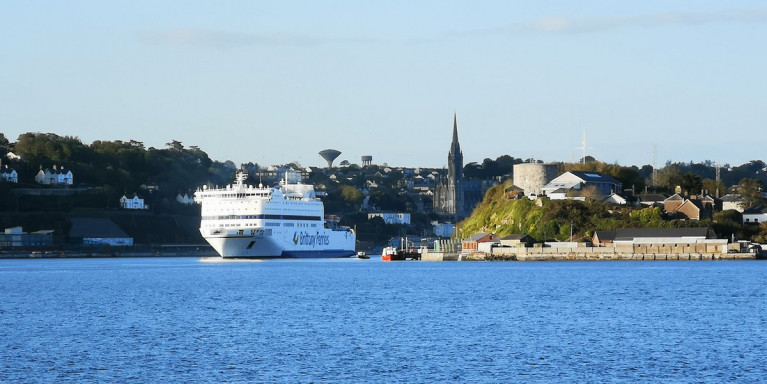Displaying items by tag: New CorkSt Malo
Newest Brexit-Bypass As Brittany Ferries 'Freight' Route Network Includes Call to Cork
Brittany Ferries Armorique arrived into Cork Harbour this afternoon after the cruiseferry completed an inaugural new Brexit-bypass France-Ireland 'freight' only route from St.Malo, writes Jehan Ashmore
Afloat tracked Armorique's arrival some ten minutes earlier than the 15:00hrs scheduled time when berthing at the Port of Cork's Ringaskiddy Ferry Terminal.
The maritime milestone marked the second leg of Brittany Ferries four-route network of Brexit-bypass freight-only services: Rosslare-St. Malo, St. Malo-Cork, Cork-Roscoff and Roscoff-Rosslare, thus forming Armorique's rotational routes roster.
Due to the impacts of Brexit coupled with Covid-19, the cruiseferry Armorique otherwise would be operating crossings on the western English Channel route of Roscoff-Plymouth. In addition to providing annual winter cover for fleetmates undergoing dry-docking maintenance etc.
This afternoon's occasion in Cork Harbour followed the launch of the first route leg when Armorique departed Rosslare Europort on Thursday bound for St.Malo. This was another first, as the freight ro-ro route links the region of Brittany and Co. Wexford.
The St. Malo-Cork route it should be noted Brittany Ferries previously operated as a passenger service too in 1993 when the Ireland-France seasonal route including to Roscoff were both operated by Duchesse Anne. The ex. Connacht of B&I Line built in 1979 at the former Verolme Cork Dockyard, made its maiden sailing from Cork to Swansea on 7th February (42 years ago!).
The four freight routes response by Brittany Ferries to providing Irish hauliers an alternative to the UK landbridge and related customs, is easily the most comprehensive compared to rival operators using Rosslare Europort, Stena Line to Cherbourg, and newcomer DFDS to Dunkirk. This been in terms of running four routes though with operating services with just a single ship.
While Irish Ferries recently redeployed ropax Epsilon on the Dublin-Cherbourg link with a weekend round trip boosting capacity to last months introduced cruiseferry W.B. Yeats, therefore with considerably more cabins for Covid related driver accompanied traffic.
Before Covid, normal 'seasonal' sailings were to resume by W.B. Yeats but much later in May, marking the start of shoulder season and into summer holidays on the year round operated route.
In relation to seasonality, Brittany Ferries began entering the Irish marketplace with the establishment of the Cork-Roscoff route in Spring, 1978 and by the 'original' Armorique. This for the first time benefited holidaymakers on the new link between the southern city and mainland continental Europe.
According to Cork Beo, the new freight-only routes will operate until the end of March, when scheduled freight and passenger services will resume between Cork and Roscoff (two months earlier than planned). Frequency on the route will double for 2021 with two weekly sailings in each direction.
Prior to the pandemic, plans by Brittany Ferries were at an advanced stage for a new direct freight and passenger service from Cork to Santander in Spain. If the plan is reaslised it could revive trade between the south coast and France and Spain as traffic increases dramatically.
The revival, Afloat adds refers to the French operator that previously inaugurated the first ever direct Ireland-Spain route launched only in 2018. This however was shortlived as the ferry company only last year switched to a new Rosslare-Bilbao route following demands by hauliers to suit their operations. (See also new Cherbourg service below).
In addition, Cork Beo added, Brittany Ferries is understood to be still considering new ro-pax (freight and passenger) routes out of Cork for the Spring/Summer season, once travel returns to normal.
The rival of Rosslare-Roscoff, Afloat adds followed Irish Ferries closure in recent years, however the Breton company's service was shortlived as further calls from hauliers dictated the ferry scene. This led to the service dropped as Cherbourg is deemed more of a transport hub. As alluded above, Brittany Ferries opened a new Rosslare-Cherbourg service last month on the route in competition with Stena Line which also recently added a new freight only route to Dublin.
As for Armorique, a next departure looms (18:00hrs) on the third leg of Cork-Roscoff route, which by then will be the half-way stage of six in total of the combined four routes.
A lay-over period however awaits Armorique back in its Breton homeport tomorrow before the ferry returns to Cork on Tuesday, then its back again to Roscoff arriving Wednesday. The next sailing from Brittany is to Rosslare Europort with an arrival on Thursday to complete the circuit.
The new freight routes follow ferry freight only operator, CLdN's decision in recent months to add a second weekly con-ro (container/vehicle) service on the Cork-Zeebrugge route that was launched last May.
Afloat will have more on a previous operator(s)? among them Cork-St. Malo Ferries using a former DFDS freighter with limited passenger capacity.





























































